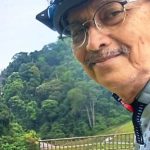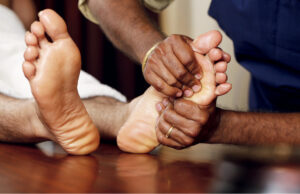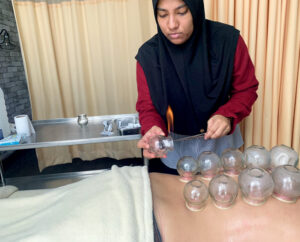There is a need to look at healthcare practices that had existed before western medication became the dominant practice

BY ADI SATRIA
With the Omicron variant spreading more rigorously than the Delta virus, we have seen a spike in Europe, the US, South Africa (where it was first discovered), and Malaysia and neighboring countries.
However, as was predicted by relevant scientists before, the good news is the number of cases in Stages 4 and 5 where you require oxygen has not increased or dropped in relation to the increase in infections for patients in Stages 1 and 2. The death rate has also declined.
The international health authorities have agreed that this variant is not as severe as the Delta virus, which affects the lungs. European countries, particularly Denmark and Sweden, have declared the end of the pandemic.
Britain and the EU countries have also cancelled the mandatory vaccination. And mind you they are in the cold countries where the flu virus spreads faster than in tropical countries like ours.
Endemic is becoming the new buzzword as countries continue to open up their economic activities and lift many restrictions. Soon the borders will be open for international tourism.
The Malaysian Prime Minister has already started to visit neighbouring ASEAN countries to prepare the SOPs for this. However, the term endemic is also sadly misused and misunderstood, which can be dangerous as people become complacent.
To an epidemiologist, an endemic infection is one where overall rates are static – not rising and not falling. It means the proportion of sick people balances out the ‘basic reproduction number’ of the virus, the number of persons an infected person would infect.
For example, common colds, malaria and polio are endemic. And smallpox was endemic until vaccines wiped it out.
So disease can be endemic, yet it can be widespread and deadly. People still die of malaria and tuberculosis. So during an endemic, precautions must still be taken and SOPs drafted by the authorities followed.
New thinking needed
The situation will not return to normal as we understood it before the pandemic broke out. So it is up to all of us to accept this situation and continue practising social distancing and wearing masks.
The situation now is to adopt new thinking and new healthcare methods, especially tackling post-Covid issues among patients in a long Covid state. This new thinking must also extend to those who have survived cancer, stroke, and heart attacks, as there is a need to ‘rehabilitate’ them to continue to improve.
This aspect is currently being undertaken by healthcare staff, but it may not be the best or at an optimum level. Rehabilitation has often been misunderstood and misrepresented. It only focuses on doing things that you can’t after a certain illness.
For example, after an accident you go through a recovery process which sometimes is very difficult. There is a correlation between the root cause, the rehabilitation process, the healing process, the prevention part and lifestyle changes.
As one grows older, many will seek treatment and the attitude most people take when they visit the doctor is to ‘take medicine’. They continue to treat the symptoms while ignoring the root cause of the disease. They seem to think that pills are the only answer to their ills.
Hence, more often than not, their pills intake will continue to increase. After a while, they will accept all this as an inevitable part of ageing.
Healthcare professionals need to embark on changing people’s lifestyles through education, be it on a personal level during a consultation or in general. We are all too familiar with the fact that people accept the doctor’s prescription without questioning why. And that is also the root cause of their problem.
Understanding the root cause of sickness
A new concept in healing needs to be introduced, which is described as ‘holistic healing’. It starts with understanding the root cause.
From here, there must be lifestyle changes. Together with physical rehab, preventive measures are then introduced by utilising human expertise and state of the art technology and equipment.
To achieve optimum health free of disease without depending on the medication, one has to learn to acquire the art of listening to the signals sent out by the body. This includes pain, growth, itchiness, abnormally high blood pressure and sugar levels which tells one that something is wrong. Learn to understand its cause and treat it by adopting lifestyle modification of diet, exercise, sleep, and not just by suppressing the symptoms.
This initiative is already being undertaken by some private healthcare organisations, which will be a game-changer in the industry. There is a need to look at all the healthcare practices that had existed before western medication became the dominant practice in many countries.

These include Traditional Chinese Medicine (TCM), acupuncture, ayurvedic treatment, homeopathy and even ‘bekam’ (cupping), and natural medications such as hemps, medical marijuana, and ketum.

While the West has already started using this new approach for many years now, Thailand is the first country in Southeast Asia to legalise its use for medical purposes. This issue is now in the Malaysian Parliament via a Parliamentary caucus. We hope it will be debated in Parliament.
Some healthcare professionals can organise this service via what they call ‘integrative healthcare’ where all this can be offered under one roof.
This will be beneficial for post-Covid, post-stroke, and post-heart attack patients, among other diseases, ensuring they enjoy a more sustainable and healthier lifestyle.
Science and research have begun to discover healing using traditional and natural herbs as practised by our ancestors before. — The Health
Adi Satria, a veteran in marketing communications, has constantly challenged himself to look at natural healing methods backed by research and science to ensure their efficacy. Practising a balanced diet and exercise of mind and body will ensure sustainable health during this pandemic and, in particular, the forthcoming endemic stage.








